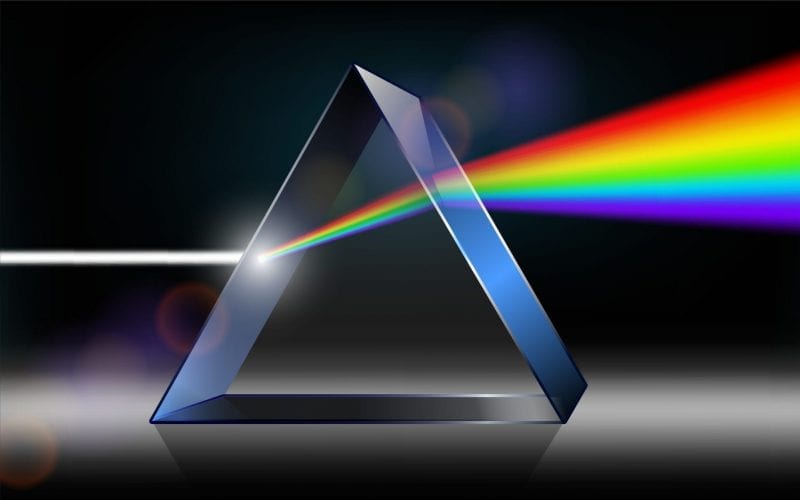Since time immemorial, a concept that has continued to intrigue mankind is the science of light. Have you ever stopped to wonder how lights of different colours are formed? Have you ever thought about the nature and principles of light, its properties and the multifarious processes related to the concept of light? Then, Spectroscopy is an intriguing field you must study! It is a sub-discipline of science that studies the process of absorption and emission of light and radiations of differing wavelengths by different forms of matter. It is an interdisciplinary blend of principles of physics and chemistry. This blog aims to elaborate upon what is spectroscopy, courses offered in this field as well as career scope it entails.
This Blog Includes:
Spectroscopy
Spectroscopy is the study of the interaction between matter and electromagnetic radiation as a function of the wavelength or frequency of the radiation. In simple words, it is the study of colours as generalized from visible light to all the bands of the electromagnetic spectrum. Spectroscopic analysis is a fundamental concept that has been used in recent years to bring about revolutionary changes in the world of physics especially in areas of quantum mechanics. Now its presence can be felt in virtually all areas of technology from the medical research to the magnetic field. Studying spectroscopy, you will get to know about electromagnetic fields of both strong and weak nuclear forces. The principles of spectroscopy can be used to study the structure of elements and atoms and can be used to unravel the mysteries of electrons and protons.
Types of Spectroscopy
Are you wondering if there is any specialization available in the field of spectroscopy? Here is the list of types of spectroscopy:
- X-ray Spectroscopy
- AE Spectroscopy
- AA Spectroscopy
- Spark or Arc Spectroscopy
- Visible and UV Spectroscopy
- IR and NRI Spectroscopy
Applications of Electroscopy
Merely gaining knowledge about what is spectroscopy doesn’t give an insight into the wide range of concepts encompassed in this study. Over the years, It has taken precedence in every field with its principles helping in new discoveries and inventions resulting in the progress in the fields. Enlisted below are some of the major applications in different areas.
- It plays an integral role in the agricultural industry. It is used to test the milk for its nutrient content and also to monitor the growth of crops and their health.
- In medical science, it is used to study amino acids which are the building blocks of protein and understand its functioning. It is also used for the treatment of cancerous cells, its identification and reaction to various medicines.
- It plays a crucial role in environmental monitoring as it is used to study the presence of aerosols and gases in the environment and its properties.
- It is used to make discoveries in chemistry by studying the structure of atoms and molecules and their configurations.
- Another vital use of it is in the fascinating science of astronomy where it is used to study the composition and density of galaxies and other astronomical objects.
Courses and Universities
Once you are familiarized with the essentials, the next step is to explore the best courses and universities in this field. Spectroscopy is a part of chemistry and is therefore not offered as a separate course but essentially studied as a module in chemistry courses. Discovering all the courses available in the field and all the esteemed universities offering these courses can be a cumbersome process. Tabulated below is a list of the major courses offered in spectroscopy and universities offering the prospective programs:
| Course | Level | University |
| Bachelors in Chemical Physics | Bachelor’s | University of Guelph |
| BSc Chemistry | Bachelor’s | London Metropolitan University |
| Bachelor’s in Medicinal and Biological Chemistry | Bachelor’s | Manchester Metropolitan University |
| Industrial Chemistry: Advanced Spectroscopy in Chemistry | Master’s | Universita di Bologna |
| Master’s in Biological Chemistry | Master’s | Cardiff University |
| Master’s Program in Chemistry and Molecular Sciences | Master’s | University of Helsinki |
| Research in Magnetic Resonance Imaging and Spectroscopy | Doctorate | University of Nottingham |
| Research in Biomedicine | Doctorate | Newcastle University |
Career Scope of Spectroscopy
If you are interested in making a career in this field, there are a large number of job profiles to pick from and experiment with. Mentioned below are some of the major jobs in Chemical Science for those with expertise and degree or its related arenas like Chemistry, Analytical Chemistry, Biochemistry, etc.
[optin-monster-shortcode id=”xf2mlnjiouddzrshykdb”]- Analytical Chemist
- R & D specialist
- Scientist
- Chromatography Contractor
- Chemist
- Pathologist
We hope this blog has dispelled all your doubts pertaining to what is spectroscopy, its applications and career scope. Planning to study a degree in Chemistry? Our team o experts at Leverage Edu can assist you in selecting a suitable course and university as per your preferences while also helping you sort out the admission process to ensure that you send a winning application! Register today for a free e-counselling session and take an informed step towards your dream career!

 One app for all your study abroad needs
One app for all your study abroad needs




















 45,000+ students realised their study abroad dream with us. Take the first step today.
45,000+ students realised their study abroad dream with us. Take the first step today.

